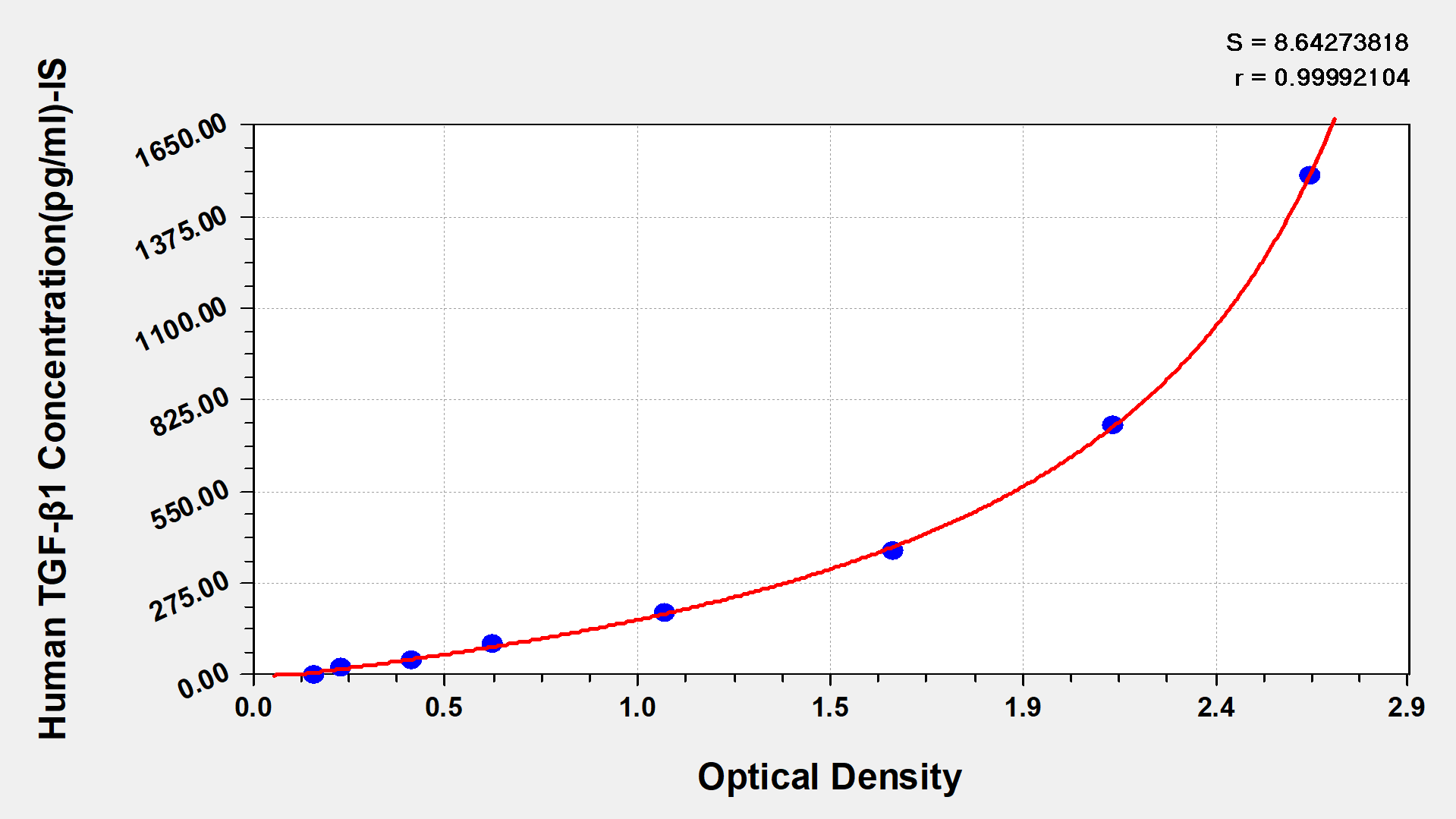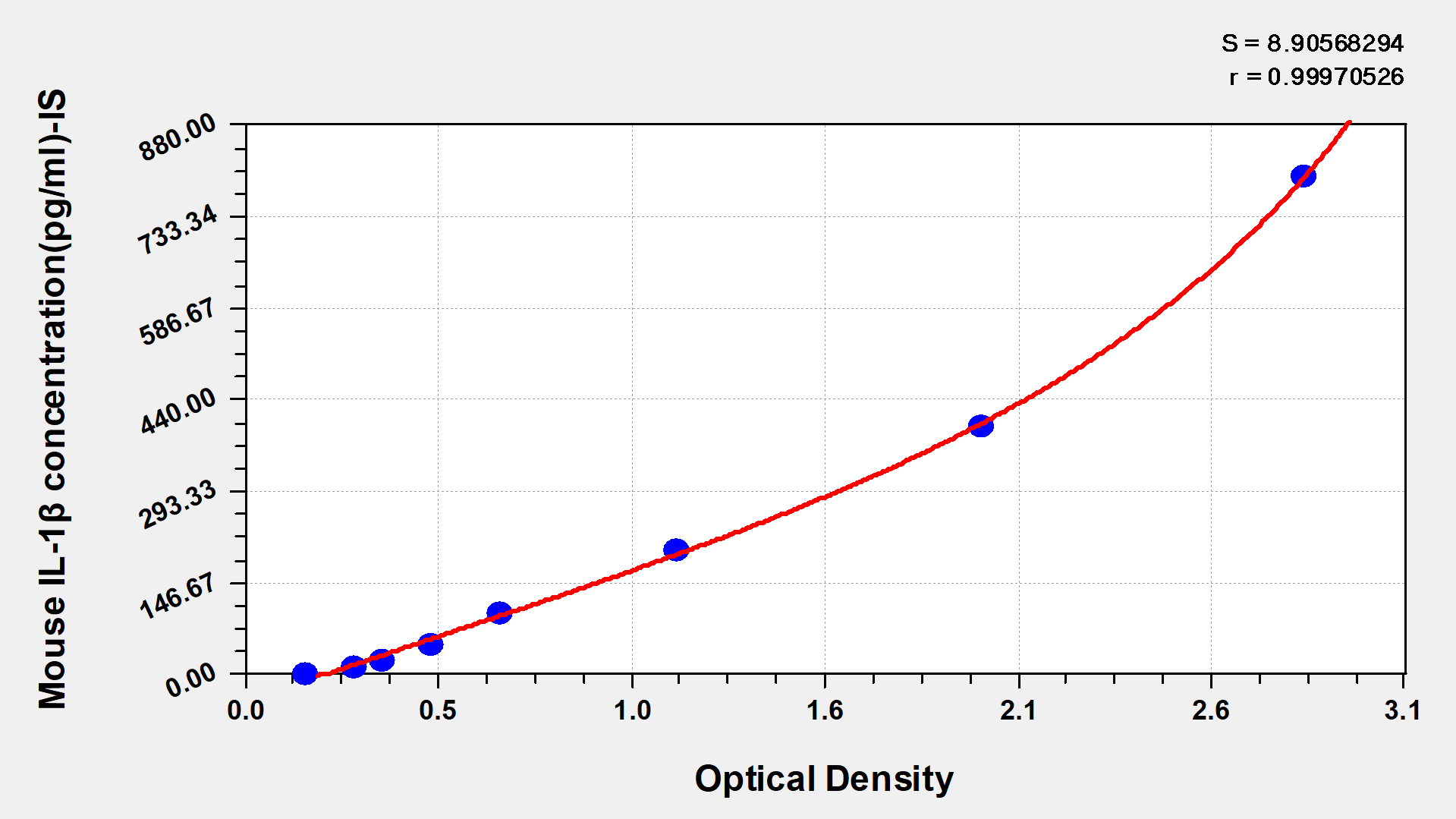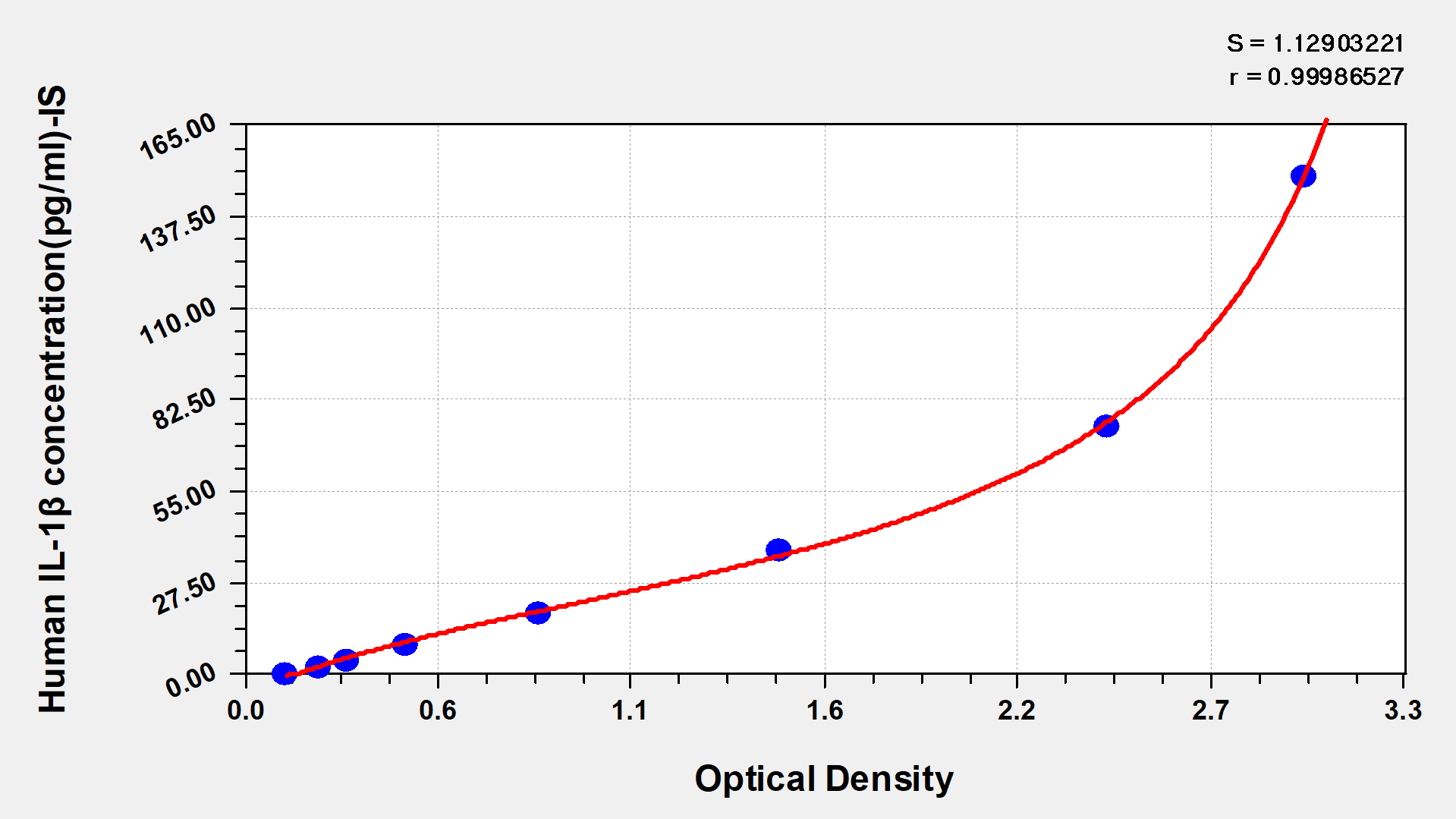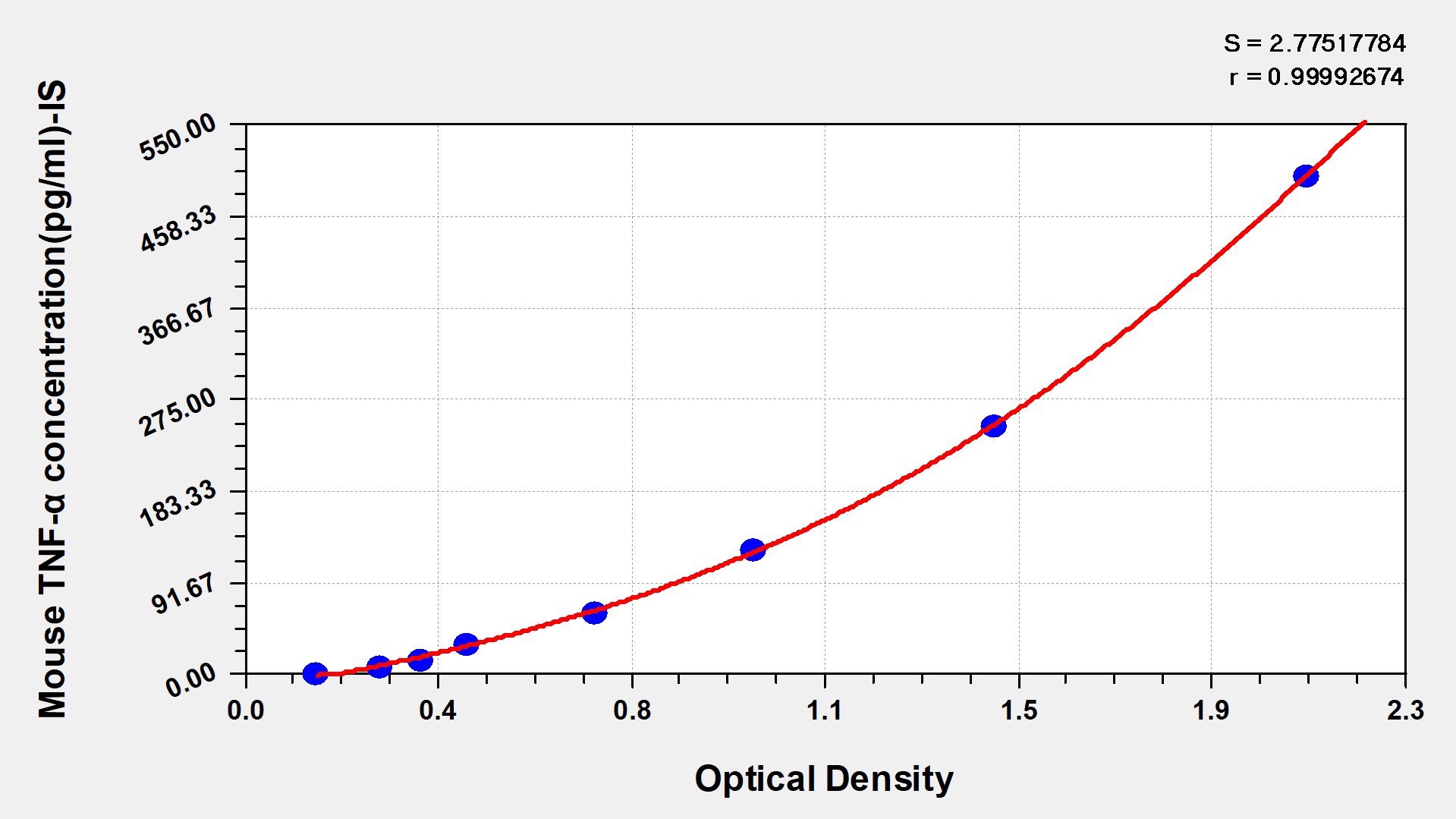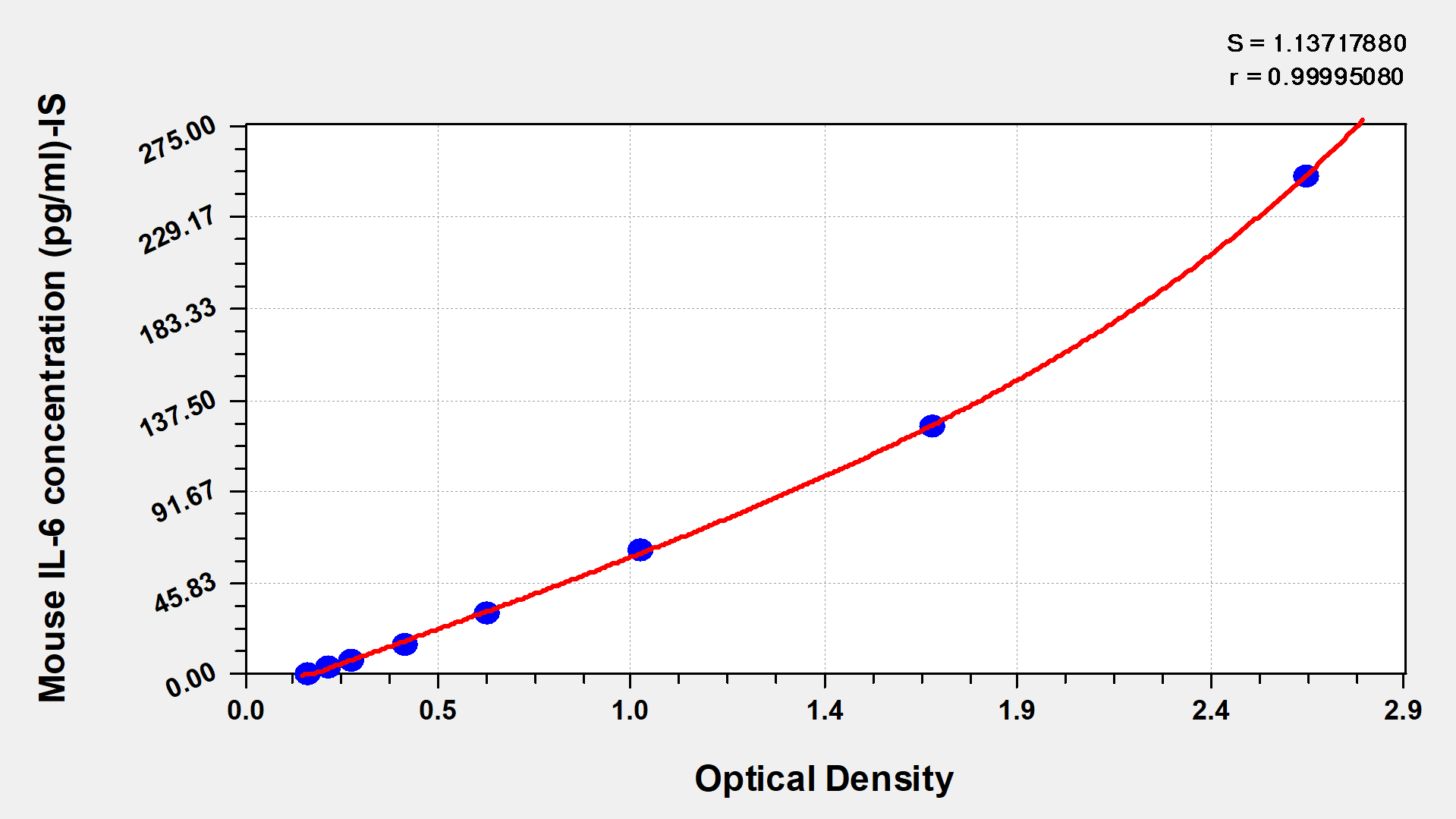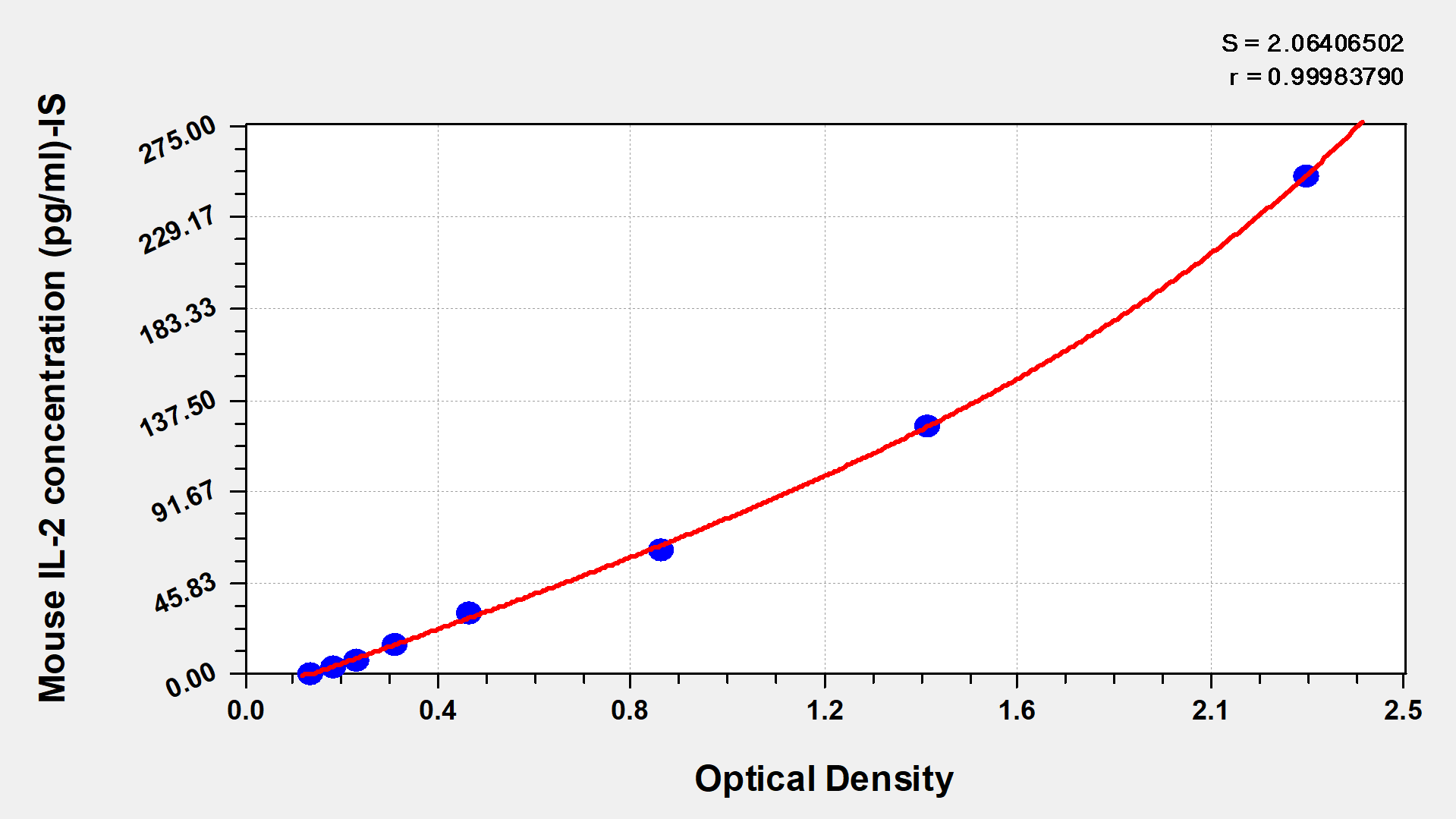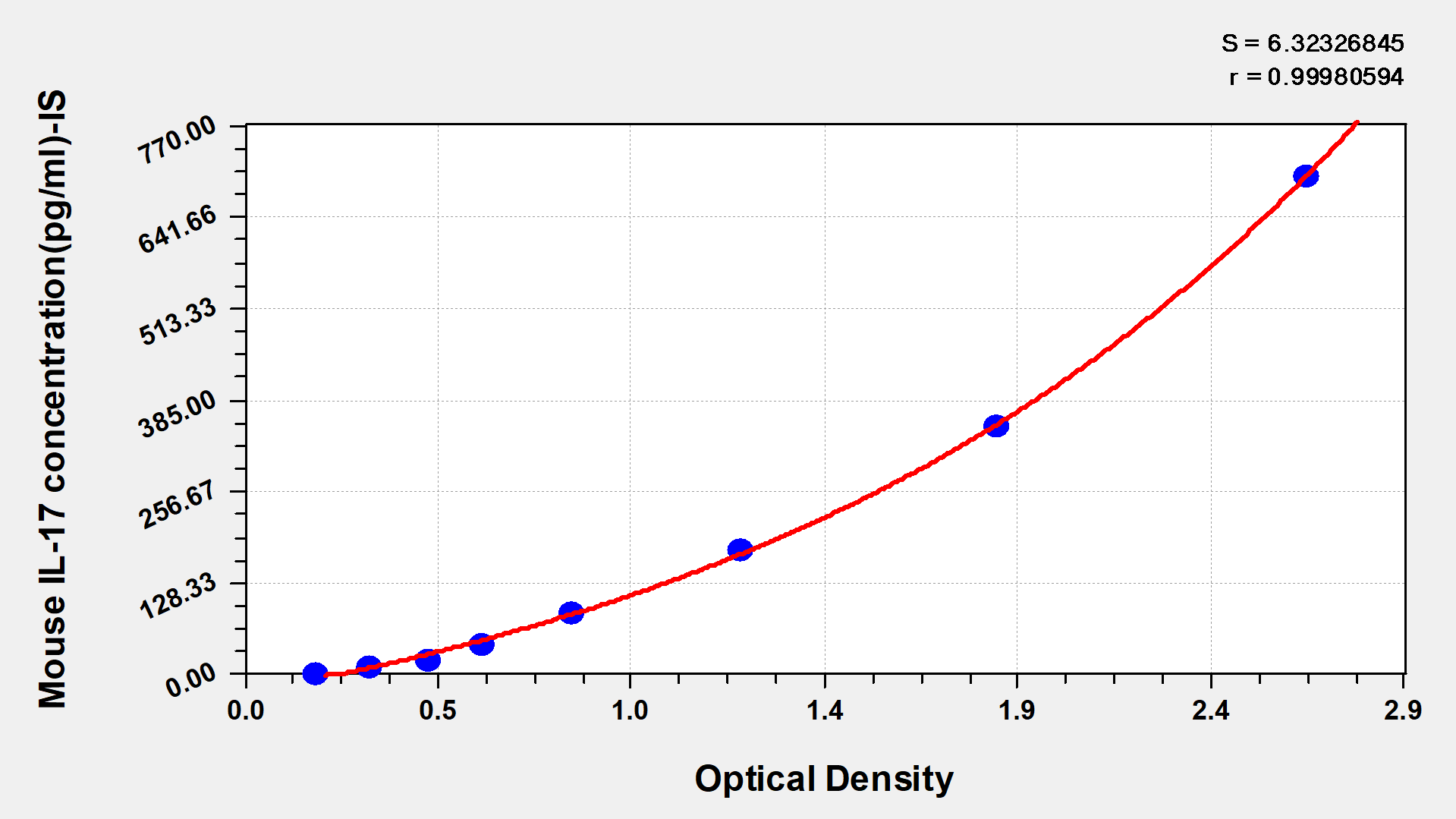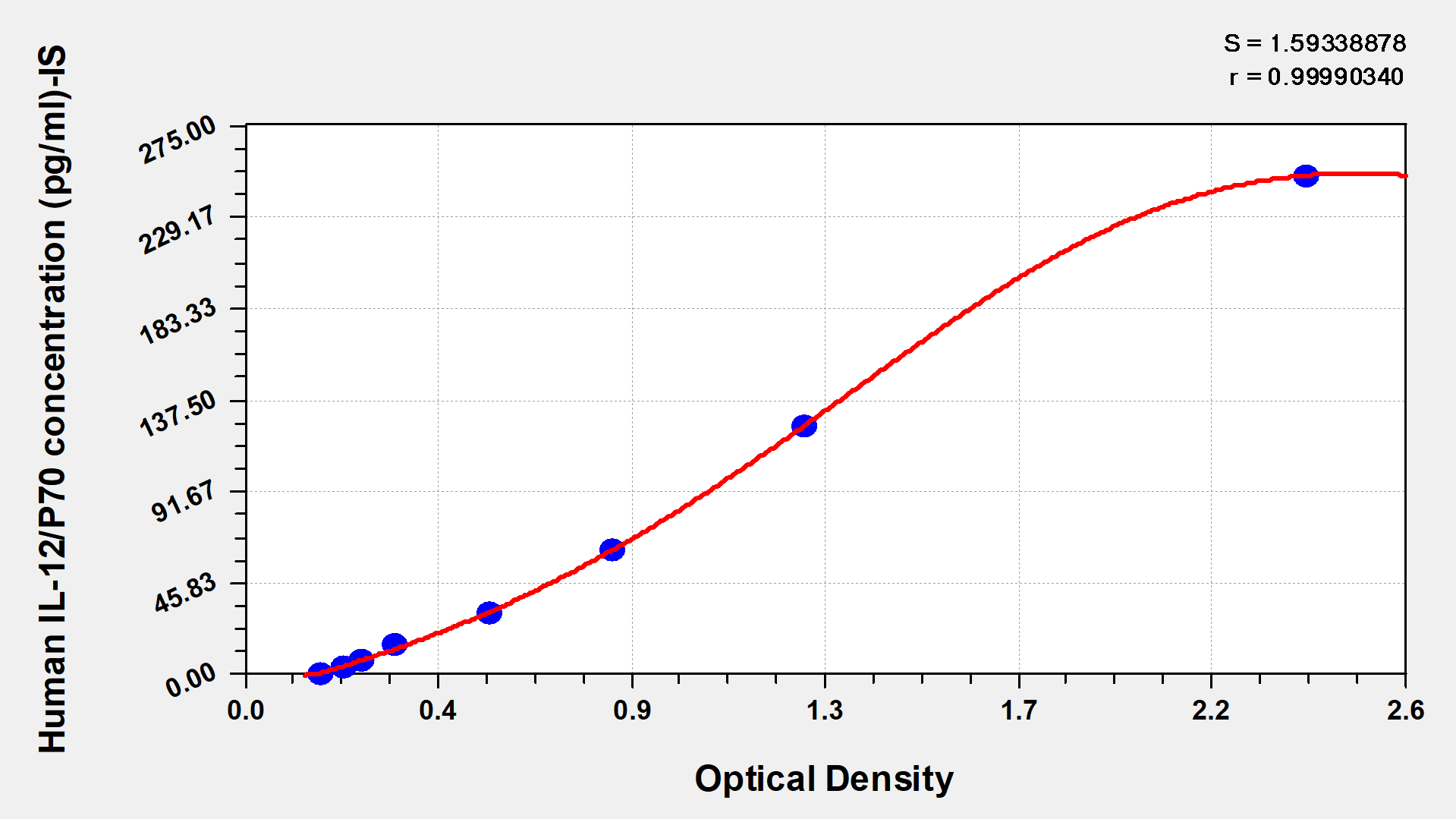-
中文名稱:人轉化生長因子β受體2(TGF-βR2)酶聯免疫試劑盒
-
貨號:CSB-E13669h
-
規格:96T/48T
-
價格:¥3600/¥2500
-
其他:
產品詳情
-
產品描述:人轉化生長因子β受體2(TGF-βR2)酶聯免疫試劑盒(CSB-E13669h)為雙抗夾心法ELISA試劑盒,定量檢測血清、血漿、組織勻漿樣本中的TGFBR2含量。TGFBR2 是重要的靶點。它是轉化生長因子-β(TGF-β)信號通路的關鍵受體。該通路參與細胞增殖、分化、凋亡等多種生理過程。異常激活或失活與腫瘤、纖維化等疾病相關。研究聚焦其信號傳導機制及阻斷策略,以開發新治療手段。試劑盒檢測范圍為15.6 pg/mL-1000 pg/mL,靈敏度為3.9 pg/mL。適合用于疾病機制研究、藥物干預效果評估或信號通路分析等科研場景,例如探究癌癥微環境中受體表達變化或炎癥模型中 TGF-β 通路活性調控本品僅用于科研,不用于臨床診斷,產品具體參數及操作步驟詳見產品說明書。
-
別名:TGFBR2; TGF-beta receptor type-2; TGFR-2; TGF-beta type II receptor; Transforming growth factor-beta receptor type II; TGF-beta receptor type II; TbetaR-II
-
縮寫:TGF-βR2
-
Uniprot No.:
-
種屬:Homo sapiens (Human)
-
樣本類型:serum, plasma, tissue homogenates
-
檢測范圍:15.6 pg/mL-1000 pg/mL
-
靈敏度:3.9 pg/mL
-
反應時間:1-5h
-
樣本體積:50-100ul
-
檢測波長:450 nm
-
研究領域:Cell Biology
-
測定原理:quantitative
-
測定方法:Sandwich
-
精密度:
Intra-assay Precision (Precision within an assay): CV%<8%
Three samples of known concentration were tested twenty times on one plate to assess.
Inter-assay Precision (Precision between assays): CV%<10%
Three samples of known concentration were tested in twenty assays to assess.
Intra-Assay Precision
Inter-Assay Precision
Sample
1
2
3
1
2
3
n
20
20
20
20
20
20
Mean(pg/ml)
113.616
109.567
118.700
121.407
123.326
117.167
SD
0.032
0.043
0.038
0.043
0.049
0.052
CV(%)
4.174
5.873
4.826
5.402
6.087
6.701
-
線性度:
To assess the linearity of the assay, samples were spiked with high concentrations of human TGF-βRⅡ in various matrices and diluted with the Sample Diluent to produce samples with values within the dynamic range of the assay.
Sample
Serum(n=4)
1:2
Average %
118
Range %
108-120
1:4
Average %
111
Range %
94-118
1:8
Average %
102
Range %
94-105
1:16
Average %
94
Range %
88-104
-
回收率:
The recovery of human TGF-βRⅡ spiked to levels throughout the range of the assay in various matrices was evaluated. Samples were diluted prior to assay as directed in the Sample Preparation section.
Sample Type
Average % Recovery
Range
Serum (n=5)
102
94-115
EDTA plasma (n=4)
103
96-118
-
標準曲線:
These standard curves are provided for demonstration only. A standard curve should be generated for each set of samples assayed.
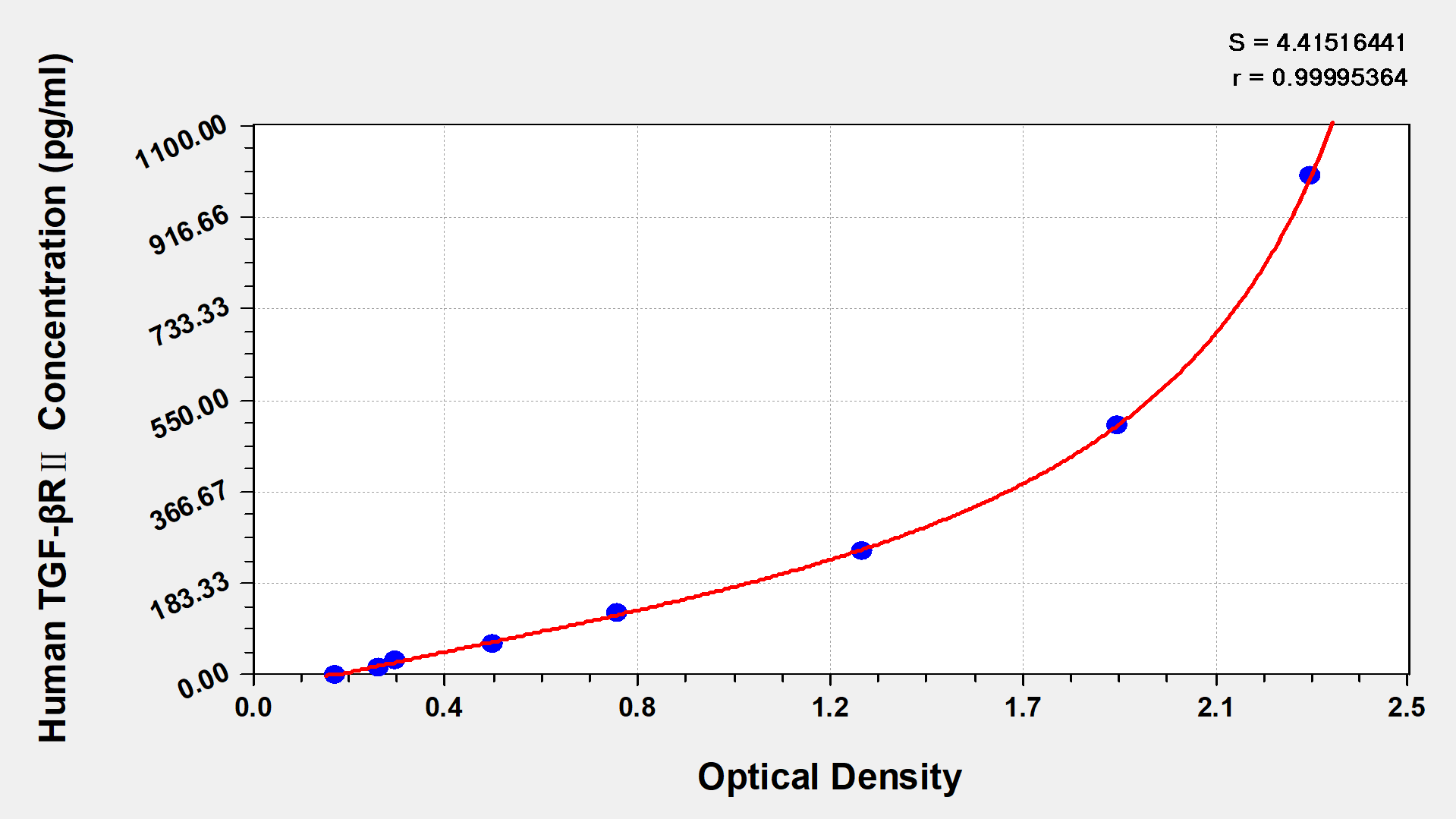
pg/ml
OD1
OD2
Average
Corrected
1000
2.246
2.285
2.266
2.074
500
1.828
1.879
1.854
1.662
250
1.347
1.281
1.314
1.122
125
0.793
0.792
0.793
0.601
62.5
0.524
0.535
0.530
0.338
31.2
0.332
0.314
0.323
0.131
15.6
0.286
0.283
0.285
0.093
0
0.187
0.196
0.192
-
數據處理:
-
貨期:3-5 working days
引用文獻
- Oral delivery of a Lactococcus lactis expressing extracellular TGFβR2 alleviates hepatic fibrosis S Yuan,Applied microbiology and biotechnology,2021
相關產品
靶點詳情
-
最新研究進展:TGFBR2是轉化生長因子β受體II的編碼基因。最近的研究表明,TGFBR2在多種癌癥中扮演著重要的角色,如結直腸癌、肺癌和乳腺癌等。研究人員發現,TGFBR2的缺失或突變可能導致細胞凋亡逃逸、腫瘤細胞的增殖和遷移、腫瘤免疫逃逸等惡性生物學特征的產生。
-
功能:Transmembrane serine/threonine kinase forming with the TGF-beta type I serine/threonine kinase receptor, TGFBR1, the non-promiscuous receptor for the TGF-beta cytokines TGFB1, TGFB2 and TGFB3. Transduces the TGFB1, TGFB2 and TGFB3 signal from the cell surface to the cytoplasm and is thus regulating a plethora of physiological and pathological processes including cell cycle arrest in epithelial and hematopoietic cells, control of mesenchymal cell proliferation and differentiation, wound healing, extracellular matrix production, immunosuppression and carcinogenesis. The formation of the receptor complex composed of 2 TGFBR1 and 2 TGFBR2 molecules symmetrically bound to the cytokine dimer results in the phosphorylation and the activation of TGFRB1 by the constitutively active TGFBR2. Activated TGFBR1 phosphorylates SMAD2 which dissociates from the receptor and interacts with SMAD4. The SMAD2-SMAD4 complex is subsequently translocated to the nucleus where it modulates the transcription of the TGF-beta-regulated genes. This constitutes the canonical SMAD-dependent TGF-beta signaling cascade. Also involved in non-canonical, SMAD-independent TGF-beta signaling pathways.
-
基因功能參考文獻:
- Data show that activated proto-oncogene protein Akt (AKT) directly phosphorylates Fas associated factor 1 (FAF1) reduces FAF1 at the plasma membrane and results in an increase in TGF-beta type II receptor (TbetaRII) at the cell surface. PMID: 28443643
- TGFBR2 Polymorphisms Are Associated with Colorectal Cancer in Patients with Lynch Syndrome. PMID: 30275229
- This study has confirmed or corrected the clinical diagnosis, and enlarged the mutation spectrum of FBN1 and TGFBR2 and confirmed that parental mosaicism may be the cause of the varied phenotypic expression of these connective tissue disorders.The results should be helpful for prenatal diagnosis and genetic counseling. PMID: 30101859
- the restoration of TGFBR2 in miR-204 overexpression Gastric cancer (GC) cells, which recovered resistance to 5-FU treatments compared with miR-204 overexpression GC cells. PMID: 29940566
- MiR-9-5p promotes the proliferation, metastasis and invasion of non-small cell lung cancer cells by down-regulating TGFBR2 expression. PMID: 29239816
- Microarray-based analyses revealed that the expression of miR-20b was significantly increased, whereas TGFBR2 and MYC were significantly downregulated and upregulated, respectively, in all ES cells compared to their expression in human mesenchymal stem cells (hMSCs). PMID: 29039480
- this study provides evidence that TGFBR2 rs6785358 polymorphism might be associated with the risk of hypospadias. PMID: 28894026
- Down-regulation of TGF-beta RII was found in the invasive non-functioning pituitary adenomas compared to noninvasive ones. PMID: 29031543
- findings reveal a novel role for miR-204/ANGPT1/TGFbetaR2 axis in tumor angiogenesis. We propose that therapeutic manipulation of miR-204 levels may represent a promising approach in breast cancer. PMID: 27703260
- High TGFBR2 expression is associated with small cell lung cancer. PMID: 28055980
- expression induced by IL-6 in keratinocytes PMID: 27892604
- hsa-miR-1193 may be involved in sporadic colorectal cancer tumourigenesis at least in part by suppression of TGFBR2, and the A allele of rs11466537 disturbed the regulation of hsa-miR-1193 on TGFBR2. PMID: 28494187
- Results show that TGFbR2 expression decreases in human gastric cancer (GC) tissue specimens and indicate that the expression of TGFbR2 is mainly dependent on post-transcriptional regulators in GC through miR-155 binding to the 3'-UTR of its mRNA. PMID: 29247570
- This study demonstrated that Increased Transforming Growth Factor beta2 in the Neocortex of Alzheimer's Disease and Dementia with Lewy Bodies is Correlated with Disease Severity and Soluble Abeta42 Load. PMID: 27911312
- Data indicate the most significant gene level association seen with transforming growth factor beta receptor 2 (TGFBR2) and clear cell epithelial ovarian cancer (EOC). PMID: 27533245
- Abnormal expression of TGF-beta type II receptor isoforms contributes to prognosis in acute myeloid leukemia. PMID: 28052022
- altered Tgfbeta signaling in cultured mouse and human enteroids supports further the in vivo data and reveals a critical role for Tgfbeta signaling in generating precursor secretory cells. Overall, our data reveal a key role for Tgfbeta signaling in regulating ISCs clonal dynamics and differentiation, with implications for cancer, tissue regeneration, and inflammation. PMID: 27791005
- MiR-130 is up-regulated in gastric cancer (GC) tissues and directly targets TGF-beta type II receptor (TGFbetaR2). PMID: 27304191
- miR-17-5p negatively regulated TGFBR2 expression by directly binding to the 3'UTR of TGFBR2 mRNA, thereby promoting gastric cancer cell growth and migration. PMID: 27120811
- High TGFBR2 expression is associated with mesenchymal to epithelial transition of breast cancer. PMID: 28987542
- Inhibition of TGFBR2 had the similar effect as miR-9 overexpression. PMID: 27756824
- we describe and characterize the functional impact of a novel VUS in the TGFBR2 kinase domain (c.1255G>T; p.Val419Leu), in a patient with the clinical diagnosis of Marfan syndrome spectrum. Our results establish that the V419L variant leads to aberrant TGF-beta signaling and confirm the diagnosis of Loeys-Dietz syndrome in this patient. PMID: 28679693
- Apo and inhibitor-bound TGFBR2 kinase structures are presented at high resolution (<2 A). PMID: 27139629
- TGF-beta type I, II, and III receptors were all identified in pregnant serum; all were substantially elevated in early-onset but not late-onset PE. Endoglin was increased in both subtypes. PMID: 28633389
- this is the first clinical report to demonstrate a potential causal association between TGFB2 gene mutations and aortic root dilatation in combination with the myxomatous degeneration of both atrioventricular valves. PMID: 28633253
- Molecular modeling and molecular dynamic simulation of the effects of variants in the TGFBR2 kinase domain as a paradigm for interpretation of variants obtained by next generation sequencing. PMID: 28182693
- A novel mutation in the TGFBR2 gene was identified in a patient with Loeys-Dietz syndrome. PMID: 28344185
- ZNF32 was found to directly bind to the TGF-betaR2 (transforming growth factor-beta receptor 2) promoter to promote its expression. PMID: 27763636
- High TGFBR2 expression is associated with glioma. PMID: 28184932
- these findings delineate the important function of the TGFbeta signaling pathway in the early development of kidney and TbetaRII was shown to be able to promote the expression of Six2 through Smad3 mediating transcriptional regulation and in turn activate the proliferation of MM cells. PMID: 28420207
- YAP-1 promotes Tregs differentiation in hepatocellular carcinoma by enhancing TGFBR2 transcription. PMID: 28472799
- Gasdermin C is upregulated by inactivation of Tgfbr2 in the presence of mutated Apc, promoting colorectal cancer cell proliferation. PMID: 27835699
- Depending on the TGFBR2 expression status of their donor cells, shed exosomes show distinct proteomic signatures and promote altered cytokine secretion profiles in recipient cells. PMID: 28376875
- miR-520f inhibited tumor cell invasion by directly targeting ADAM9 and the TGFbeta receptor TGFBR2. PMID: 28209612
- Study demonstrated that the TGFBR2 mutation was not present in the sample of cervico-cerebral artery dissection patients (CCAD); however, a positive association was identified between the MTHFR-C677T polymorphism and genetically confirmed Mexican mestizo spontaneous CCAD patients PMID: 27017342
- A genetic investigation found a TGFbetaR2 gene mutation, leading to the diagnosis of Loeys-Dietz syndrome type2. PMID: 27017362
- The results showed that transfection of CD34(+) cells with SiRNA targeting TGF-bRII and their co-culture with human bone marrow mesenchymal stromal cells (MSCs) could considerably increase the number of progenitors PMID: 27344285
- Cell invasion (matrigel) was reduced only in the Hs578T cells (p < 0.01). Silencing decreased the expression of the prometastatic molecules S100A4 and TGFbetaR2 in both cell lines and CD44 in Hs578T cells. We conclude that ECM1 is a key player in the metastatic process and regulates the actin cytoskeletal architecture of aggressive breast cancer cells at least in part via alterations in S100A4 and Rho A. PMID: 27770373
- Our study uncovers a novel mechanism that miR-19a-3p/19b-3p inhibits autophagy-mediated fibrogenesis by targeting TGF-beta R II. PMID: 27098600
- TGFBR2 signaling can affect Notch1 glycosylation via regulation of glycosyltransferase LFNG expression and provide a first mechanistic example for altered glycosylation in microsatellite instability colorectal tumor cells. PMID: 27156840
- CD44 and TGFBR2 are the functional targets of miR-373, which are responsible for the tumor suppressive functions of miR-373 PMID: 26858153
- Polymorphism of TGFBR2 is associated with coronary artery disease. PMID: 27234600
- Results found TGFBR2 to be significantly related to the regulated phosphoproteome in glioblastoma as a result of integrative upstream kinase/ regulator analyses and experimentally validated as a novel regulator of glioblastoma stem cells. PMID: 26670566
- Reduced expression of TGF-beta type II receptor and extracellular matrix components in response to reduced fibroblast size/mechanical force was fully reversed by restoring size/mechanical force PMID: 26780887
- results suggested that high CDKN1A/p21 and low TGFBR2 expression was closely correlated with adverse pathological parameters and poor prognosis in breast cancer. PMID: 26823785
- Findings suggest that the upregulation of miR-590-5p promotes cellular malignant behavior via the target gene TGFbetaRII in vulvar squamous cell carcinoma. PMID: 26498065
- TGFBR2 is regulated by an epigenetic auto-feedback regulation in non-small cell lung cancer. PMID: 26356817
- we reported a sporadic Japanese case of LDS with a novel TGFBR2 p.Y424H mutation, which appeared to cause pregnancy-related fatal aortic/arterial dissections. PMID: 26301661
- AT2R downregulates the expression of TGF-betaRII in human proximal tubule cells PMID: 26867007
- High levels of TbetaRII expression were associated with lymph node metastasis, increasing tumor clinical stage, and poorer 5-year disease-free survival in patients with breast cancer. TbetaRII may be a potential prognostic marker for breast cancer. PMID: 26551005
顯示更多
收起更多
-
相關疾病:Hereditary non-polyposis colorectal cancer 6 (HNPCC6); Esophageal cancer (ESCR); Loeys-Dietz syndrome 2 (LDS2)
-
亞細胞定位:Cell membrane; Single-pass type I membrane protein. Membrane raft.
-
蛋白家族:Protein kinase superfamily, TKL Ser/Thr protein kinase family, TGFB receptor subfamily
-
數據庫鏈接:
Most popular with customers
-
Human Transforming Growth factor β1,TGF-β1 ELISA kit
Detect Range: 23.5 pg/ml-1500 pg/ml
Sensitivity: 5.8 pg/ml
-
-
-
Mouse Tumor necrosis factor α,TNF-α ELISA Kit
Detect Range: 7.8 pg/ml-500 pg/ml
Sensitivity: 1.95 pg/ml
-
-
-
-



